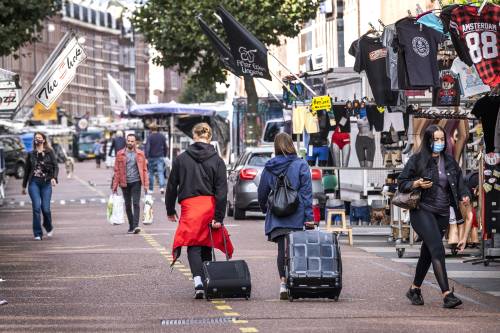Let's work together to reshape the Amsterdam taxi market.
The world of the Amsterdam taxi industry is nowhere near as shiny as the lights of the city. In fact, it's a market riddled with unfair practices, sky-high prices, and a blatant lack of transparency. Far too often innocent tourists and residents are exploited by a system that is inherently unfair and corrupt. The recent tweet by René Mioch, in which he complains about drivers demanding at least €50 for a trip to the city center, is just the tip of the iceberg.
In the maze of Amsterdam's streets, a row of taxis becomes an ominous wall of negotiation and intimidation. Front-line drivers refuse rides unless they are assured of a minimum fare, which is often out of proportion. Growing taxi queues at popular hotspots are symptoms of an industry in decline. The result? Tourists and residents are left with a bitter taste and a feeling of being ripped off.
The current model for the entry market in Amsterdam is based on price agreements. But these agreements, which often ignore the average consumer, create a stratification of rates that are confusing and unfair. In a world where transparency and fairness should be at the heart of a sustainable business model, the Amsterdam taxi market is a sad example of the opposite.
Tourists are often targeted by these extortion tactics. Unfamiliar with the local rates and the language barrier, they are forced to pay exorbitant amounts. This exploitation casts a shadow over the tourist experience and threatens to undermine Amsterdam's reputation as a welcoming city.
An urgent appeal to all well-known Dutch people - artists, presenters, athletes, politicians, and influencers. You have a platform and a voice that can resonate with millions of people. It's time to use that voice to bring about change. We may need your help to expose these problems in the Amsterdam taxi market.
Use your social media accounts, your interviews, and your public appearances to shed light on these unjust practices. Tell your stories, share your experiences, and encourage your followers to do the same. The more people talk about these issues, the greater the pressure will be on policymakers and industry to change something.

It is time for the taxi market in Amsterdam to change. There is an urgent need for reforms that make the industry more transparent, fair and customer-oriented. Online booking and payment platforms should be the new normal. This allows customers to know and pay the cost of their ride in advance, avoiding unnecessary negotiations and exorbitant rates.
Let's work together to reshape the Amsterdam taxi market. Your influence can be a powerful weapon in this battle. Together we can ensure that the streets of Amsterdam become a safe and fair place again for everyone who needs a taxi.
As Mioch suggested, tourists and residents should leave the traditional entry level market for what it is and opt for online platforms or apps. But this change also needs to be driven by policymakers and regulators. They have a responsibility to ensure that the taxi market in Amsterdam is fair for everyone.
Until then, the Amsterdam taxi market will continue to suffer under its own weight, supported by corrupt practices and the abuse of unsuspecting customers. The call for change is getting louder. It is high time that the city of Amsterdam stands up and reforms the taxi market.
The advantage of apps and online platforms lies in their transparency. They provide clarity about rates in advance, without room for unreasonable negotiations or unexpected costs. In addition, these platforms often have rating systems that allow customers to share their experiences, providing an extra layer of accountability for drivers.
Nevertheless, the demand for regulation and reform of the traditional taxi industry remains pertinent. Policy makers and regulators must introduce strict rules to combat unfair pricing and rip-off. There is a greater need for strict enforcement, regulation and punishment for those who do not follow the rules.
At the same time, the taxi companies themselves must undergo a change of mentality. Instead of maximizing profit at the expense of customers, they should strive for better customer service, honesty and integrity. This includes offering fair rates, clear communication, and respecting customers' rights.
In the current situation, it is tourists and locals who are paying the price for Amsterdam's dysfunctional taxi industry. This has to change. The city deserves a taxi market that is reliable, transparent and fair for everyone. And this can only be achieved if everyone – from policymakers to taxi companies and consumers – does their part.
It's time to light up the dark streets of Amsterdam's taxi market and give the city back to its residents and visitors. Let's seize this opportunity to bring about the change that is so much needed. The Amsterdam taxi market has been in the shadows for too long – it's time to write a new chapter.



